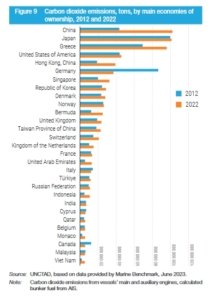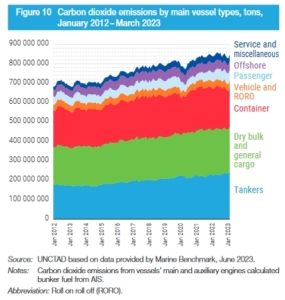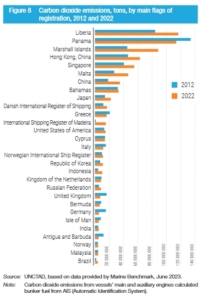UNCTAD calls for the decarbonization of shipping. Over 100 thousand ships for replacement and modernization




 By Marek Grzybowski
By Marek Grzybowski
Decarbonization is the most important goal of maritime transport operators and participants – call UNCTAD experts in the latest “Review of Maritime Transport 2023”. Despite replacing ships or modernizing their propulsion systems, emissions of harmful substances have increased by 20% over the last ten years.
Adopting the UNCTAD methodology and taking into account the shipyard’s full order portfolio (mainly from Asia), it can be estimated that approximately 110,000 ships sail on the oceans today. ships with a tonnage of over 2.3 billion GT. “As of January 2023, the world fleet consisted of 105,493 ships of 100 GT and above. In 2022, the supply of cargo space increased at an annual rate of 3.2%, and the total tonnage reached 2.27 billion deadweight tons,” UNCTAD experts calculated.
The United Nations Conference on Trade and Development (UNCTAD), in its Maritime Transport Report 2023 launched on World Maritime Day, called for a “just and equitable transition” towards developing the shipping industry by developing low-carbon shipping.
UNCTAD emphasizes the need to accelerate the introduction of low-emission fuels, digital solutions and a just transition to combat persistently high greenhouse gas emissions and regulatory restrictions in maritime transport in general.
Shipping and ports are the lifeblood of the economy
The Covid-19 pandemic and problems with disruptions in global supply chains after Russia’s attack in Ukraine have taught us nothing. Practically, the global decooperation of production persists and the world production of most economies depends on efficiently operating long- and short-sea shipping and the capacity of large and small ports.
It is once again emphasized that maritime transport is responsible for over 80% of the global flow of goods in international trade. However, this is only 3% of global greenhouse gas emissions. However, it should be noted that despite the replacement or modernization of ships, emissions of harmful substances have increased by 20% over the last ten years.
That is why UNCTAD Secretary-General Rebeca Grynspan said during the “Review of Maritime Transport 2023” presentation:
– Maritime transport must decarbonize as quickly as possible while ensuring economic growth. The balance between transport sustainability, regulatory compliance and the environmental requirements of economies is key to a successful future for maritime transport.
Time for ecological fuels
“UNCTAD, ahead of the United Nations Climate Change Conference (COP28), which will be held in November this year, advocates the transition to cleaner fuels in shipping,” the report emphasizes.
The point is to actually implement an effective fleet transformation strategy that will meet social expectations and environmental needs. The transformation should be procedurally fair and socially responsible. It should be based on the latest technological solutions.
The transformation of shipping must also be fair for countries using maritime transport around the world. UNCTAD emphasizes that it is necessary to base the transformation of maritime transport on system-wide cooperation. It is necessary to support it by introducing quick regulatory interventions and solid investments in green technologies and fleets.
However, the above demands involve increasing expenditure. Investments in innovative technologies are becoming more and more expensive and are passed on to maritime transport customers.
Switching to eco-friendly transport involves significant costs. UNCTAD found that an additional $8-28 billion annually would be needed to decarbonize ships by 2050. These are expenses that will have to be borne by shipowners.
Time to port investement
By 2050, investments will be needed in ports and fleet operating companies. Experts estimate that it will be necessary to spend between $28 and $90 billion annually on infrastructure to provide 100% carbon neutral fuels. Additionally, port quays and bunkering systems will require modernization.
“Full decarbonization could increase annual fuel costs by 70% to 100%, affecting small island developing states (SIDS) and least developed countries (LDCs) that rely heavily on various forms of maritime transport,” UNCTAD experts warn.
Therefore, to ensure a just transition to environmentally friendly shipping, UNCTAD calls for a universal regulatory framework applicable to all ships, regardless of their flag, ownership or operational area. “This will avoid a two-speed decarbonization process and maintain equal conditions for its implementation and operation of economies,” UNCTAD emphasizes.
– Economic incentives, such as fees or contributions paid in connection with emissions from maritime transport, can encourage [fleet operators – MG] to act, can promote the competitiveness of alternative fuels and reduce the cost gap compared to conventional heavy fuels – says Shamika N. Sirimanne , UNCTAD’s Director of Technology and Logistics.
In her opinion, “the funds could also facilitate investments in seaports in SIDS and LDC countries.” Expenditures should focus on adapting the infrastructure to handle increasingly modern ships, as well as modernizing the operation of commercial vessels and modernizing transport systems, as well as investments in the digitalization of seaports in less developed countries.
ICT and space technology support decarbonization
In addition to cleaner fuels, UNCTAD draws attention to the important role of computerization in accelerating the decarbonization of shipping. It should also be emphasized that this process will not be possible without the development of satellite systems.
Effective benefits in terms of increasing fleet efficiency and reducing supply chain disruptions can be achieved by combining investment efforts in all of these areas. Today we can see the importance of computerization and space technologies by trying to track fleets of “shadow” ships and the routes of oil, grain and people smugglers.
– By investing in digitalization and modern technologies, we enable the development of predictable and reliable shipping – emphasizes Sirimanne and states that “the use of technologies such as artificial intelligence, machine learning, IT clouds, blockchain and IoT will result in the optimization of fleet efficiency.”
The aim is to increase the scope of monitoring the movement of ships and goods, planning routes and services. All these activities will contribute to the optimization of ship passages between ports and cargo planning. This ultimately reduces the harmful impact on the environment and reduces the carbon footprint.
“Review of Maritime Transport 2023″ also analyzes changes in relations among global trade participants. Particular attention was paid to the effects of the war in Ukraine and their impact on local and global supply chains. UNCTAD experts come to the same conclusions as presented on www.GospodarkaMorska.pl.
“As a result of the disruption of the war in Ukraine, oil cargo distances reached an all-time high in 2022 and grain shipments in 2023 exceeded any other record year as grain-importing countries were forced to seek alternative exporters such as the US and Brazil that require long-distance transport,” say UNCTAD analysts.
Shipping is supposed to be resistant to logistical storms
“Despite a 0.4% decline in total maritime trade volumes in 2022, the industry expects to grow by 2.4% in 2023, with container trade (which declined by 3.7% in 2022) expected to grow by 1.2% in 2023 and over 3% in the period between 2024 and 2028.” – UNCTAD experts predict. It seems that in the case of container transport, optimistic forecasts will have to be postponed to 2024.
Oil and gas trade volumes showed significant growth in 2022, while tanker freight rates saw a strong recovery driven by geopolitical events. Bulk freight rates have been volatile due to changing demand, port congestion, geopolitical tensions and weather disruptions.
So far, 2023 has been another year of increasing demand and supply for the maritime crude oil trade. This is despite high oil prices and the risk of economic recession.
Global crude oil transport increased
“According to vessel tracking data from Refinitiv, in the period from January to August 2023, global crude oil transport increased by 7% y/y to 1,440.7 million tonnes, excluding cabotage trade,” says Banchero Costa i in the latest report emphasizes that “this was well above 1,346.5 million tonnes in January-August 2022 and 1,240.3 million tonnes in January-August 2021, but also slightly above 1,397.3 million tonnes in same period of 2019.”
This result was expected to be influenced by growing exports from the Persian Gulf oil fields, which increased by 0.4% y/y to 581.0 million tonnes in the period January-August 2023, which accounted for 40.3% of global marine oil trade. Exports from Russia increased by 4.7% y/y to 154.8 million tons, representing 10.7% of world trade. Cargoes by sea from the USA increased by 19.9% y/y to 126.4 million tons. From West Africa, crude oil exports increased by 0.5% y/y to 115.5 million tonnes.
China seaborne imports increased
On the demand side, seaborne imports to China increased by a record 23% y/y to 341 million tonnes in January-August 2023, accounting for 23.6% of global trade.
In summary, UNCTAD calls not only for the decarbonization of fleets and ports but also for a just and equitable transition to low- and zero-emission shipping. The organization calls for system-wide engagement and regulatory solutions to combat the growing environmental challenges facing the maritime sector. Bold, timely action and concerted efforts are needed to ensure a sustainable, resilient and prosperous future for maritime transport, UNCTAD urges.
